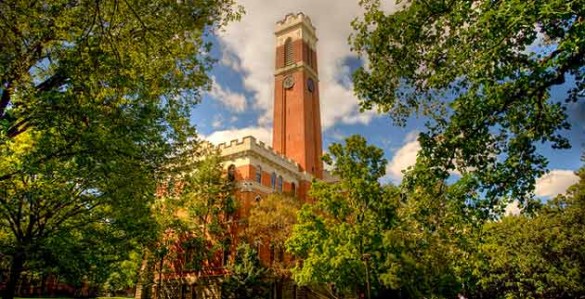
Vanderbilt University is part of a new coalition of diverse public and private colleges and universities created to improve the college admission application process for all students.
The Coalition for Access, Affordability and Success is developing a free platform of online tools to streamline the experience of applying to college. The initial iteration of the platform will be available to freshmen, sophomores and juniors in high school beginning in January 2016. (Oct. 21, 2015 Ed. Note – platform launch is now scheduled for April 2016).
In creating this platform, the participating institutions hope to recast the college admission process from something that is transactional and limited in time into a more engaged, ongoing and educationally reaffirming experience. They also hope to motivate a stronger college-going mindset among students of all backgrounds, especially those from low-income families or underrepresented groups who have historically had less access to leading colleges and universities.

“Access and opportunity are of the highest importance at Vanderbilt and we strongly believe that the world-class education Vanderbilt provides should be available to all qualified students,” said Douglas L. Christiansen, Vanderbilt’s vice provost for university enrollment affairs and dean of admissions and financial aid. He is also the chair of the board of trustees of the College Board. “The coalition will help remove many of the barriers that discourage students from applying to colleges and for financial aid.”
The Coalition for Access, Affordability, and Success currently includes more than 80 public and private universities and colleges across the United States that have made a commitment to make college affordable and accessible for students from diverse backgrounds, and for students to be successful in completing their education.
Opportunity Vanderbilt replaces need-based undergraduate loans with scholarship support. Opportunity Vanderbilt helps ensure that young people of every background can attend Vanderbilt, creating a dynamic learning community that benefits every student. Since its launch, the number of Vanderbilt students borrowing with need-based loans, both institutional and federal, dropped 73 percent.
The coalition, which continues to add members, will be working over the next few months to develop tools and processes that will help to address many of the barriers that prevent students from attending college or successfully earning a degree.
“The college admission process today can be stress-inducing and we know it can present barriers for all students, especially for those who are the first in their family to attend college,” said Zina L. Evans, vice president for enrollment management at the University of Florida.
“The schools in the coalition have individually tried many different and creative approaches to address these challenges,” said Jeremiah Quinlan, dean of undergraduate admissions at Yale University. “We have come to the conclusion that we can have a much bigger impact on student access and completion if we work together.”
Later this year, the coalition will unveil new college planning and application tools that will streamline the admission and financial aid processes and allow students to begin planning for college much earlier in their high school years. The online tools, which will include a digital portfolio, a collaboration platform, and an application portal, seek to reshape the process of applying to college as the culmination of students’ development over the course of their high school careers, reducing the unfamiliarity of the application and leveling the playing field for all students. The application will add another option to all the ways that students currently apply for college.
For example, research has found that students from disadvantaged backgrounds often do not participate effectively in the college application process, struggle with applying for financial aid, and often do not get awarded all the financial aid they qualify for. As a result, even the most highly qualified students either do not attend college, attend a college that does not engage their full potential, or do not complete their degrees. Attending a high school with a college-going culture greatly increases students’ college success.
The coalition aims to address these findings through its free online tools and increased transparency around admissions and financial aid.
“The fact that some highly motivated and well-prepared students do not apply to and enroll in the college they are best suited for is a persistent problem,” said Barbara Gill, associate vice president for enrollment management at the University of Maryland. “This coalition is working to mitigate this problem by empowering students from disadvantaged backgrounds to immediately identify a diverse set of schools that are likely to provide considerable financial support and will invest in their academic success.”
Members of the coalition include a diverse group of public universities that have affordable tuition along with need-based financial aid for in-state residents, and private colleges and universities that provide sufficient financial aid to meet the full, demonstrated financial need of every domestic student they admit. Coalition schools graduate at least 70 percent of their students within six years, with many having much higher graduation rates. Vanderbilt’s four-year graduation rate is 88 percent; the six-year rate is 93 percent.
The coalition’s online portfolio will be open to high school students starting in January 2016. Additional details about the application process enabled by the platform will be announced before summer of 2016. More information can be found at coalitionforcollegeaccess.org.
Coalition Member Institutions
Amherst College
Bates College
Bowdoin College
Brown University
Bryn Mawr College
California Institute of Technology
Carleton College
Clemson University
Colby College
Colgate University
College of Holy Cross
College of William & Mary
Colorado College
Columbia University
Connecticut College
Cornell University
Dartmouth College
Davidson College
Duke University
Emory University
Franklin and Marshall College
Franklin W. Olin College of Engineering
Georgia Institute of Technology
Grinnell College
Hamilton College
Harvard University
Haverford College
Illinois State University
Indiana University – Bloomington
James Madison University
Johns Hopkins University
Miami University – Ohio
Michigan State University
Middlebury College
Mount Holyoke College
North Carolina State University at Raleigh
Northeastern University
Northwestern University
Oberlin College
Ohio State University
Penn State
Pomona College
Princeton University
Purdue University
Reed College
Rice University
Rutgers University – New Brunswick
Skidmore College
Smith College
St. Olaf College
Stanford University
State University of New York – College at Geneseo
State University of New York – University at Buffalo
Swarthmore College
Texas A&M University
Tufts University
Union College
University of Chicago
University of Connecticut
University of Florida
University of Illinois at Urbana-Champaign
University of Maryland – College Park
University of Michigan
University of Minnesota – Twin Cities
University of Missouri
University of New Hampshire
University of North Carolina at Chapel Hill
University of Notre Dame
University of Pennsylvania
University of Pittsburgh
University of Rochester
University of South Carolina
University of Vermont
University of Virginia
University of Washington
Vanderbilt University
Vassar College
Virginia Polytechnic Institute and State University
Washington University in St. Louis
Wellesley College
Wesleyan University
Williams College
Yale University